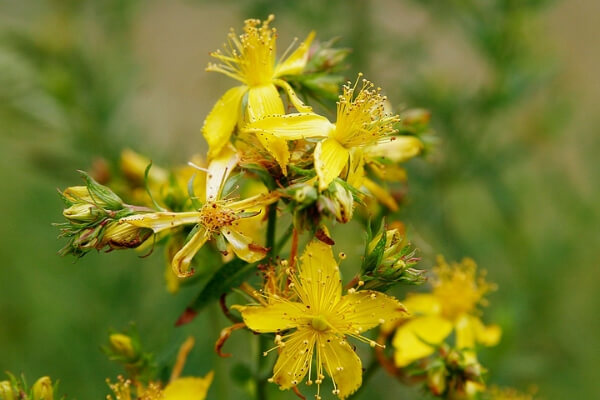St John’s Wort is one of the most popular herbal supplements we stock here at SS Healthfoods. Not only has it been shown to combat ‘the blues’ or treat mild to moderate depression but it can also combat nervousness, poor appetite & fatigue.
In this post, we’re going to be conducting a review into the effectiveness of St John’s Wort and measure the side effects, benefits and how it can be used for treating depression.
What is St John’s Wort?

Mind, which is a mental health charity in the United Kingdom outlines that St John’s Wort has been around for hundreds of years, primarily to treat mental health issues. St John’s Wort (Hypericum Perforatum as its known botanically) a herbaceous perennial plant which can grow up to 1m high.
It is native to Europe and Asia and it is typically a wild plant that has star-shaped, yellow flowers. The reason why it’s named St Jon’s Wort is that it is harvested traditionally around the time of St John’s Day (who was one of the apostles of Jesus Christ in the New Testament), which is June 24th, the day of his birth.
The yellow star-shaped flowers and its buds are usually dried and made into capsules or tea for consumption, but sometimes the flower is pressed and it is also used for oils and other liquid extracts.
St John’s Wort Benefits
As previously mentioned, St John’s Wort is used as a mood enhancer as it is used to treat mild depression but also it may also help with nerves, anxiety, poor appetite or fatigue.
Cochrane conducted a systematic review and it came to the conclusion that St John’s Wort has the potential to be effective in treating major depression. This is sort of backed up in a 2016 review of 35 different studies that came to the conclusion that St John’s Wort reduced the effects of mild to moderate depression more than prescription antidepressants and a placebo effect.
It is not limited to just people’s mood either, a 2017 study showed that the herbal plant was extremely effective in treating body injuries such as bruises, burns & sores.
With St John’s Wort mood-enhancing effects, it also increases the body’s levels of serotonin, which is a brain chemical which has been thought to regulate things like anxiety, happiness & mood. People who have been trialled with mild depression have found that sometimes increased serotonin levels brighten their mood.
St. John’s Wort Side Effects

One thing to immediately note is that when you combine St John’s Wort with certain antidepressants, it can lead to a potentially life-threatening amount of serotonin in your brain. It can also bring on the early stages of Serotonin Syndrome. Other symptoms listed by the United States National Center for Complementary and Integrative Health include things such as:
- Higher blood pressure & high blood pressure in general
- Increase in body temperature
- Increased agitation levels
- Whilst not limited to those four symptoms, there are many more you should undertake research on before taking the supplement. There have also been claims that St John’s Wort has adverse effects on people with bipolar disorder or schizophrenia by increasing the severity of the psychotic symptoms that they are showing.
As well as increasing the levels of serotonin to dangerous levels in the brain, St John’s Wort can also weaken many prescription medicines such as other antidepressants, contraception & cancer medicines. St John’s Wort gives its user stimulation, which can actually worsen the feelings of anxiety sometimes.
There have also been studies conducted on the following conditions. However, according to Medical News Today, they need further research & evidence and have yet to be concluded successfully. The following conditions analysed by scientists are:
- Perimenopausal symptoms
- Premenstrual syndrome
- Seasonal affective disorder
- Social phobia
- Obsessive-compulsive disorder
- Sharp pains in nerves
- A sensation of burning mouth
- Post-surgery pain.
St John’s Wort Dosage
You can get different dosages from different brands and products you buy. Mind states that although there is no standard dosage restrictions in the United Kingdom that a suggested dosage is between 200mg and 1,000mg of 0.3% of standardised hypericum extract per day.
Blair Green Thielemer told Healthline that dosage for St John’s Wort varies due to the product not having standard manufacturing procedures.
He did go onto say that a normal dose for the average person goes from 300mg to 1,200 mg per day. His advice is also to break it up throughout the day, ie 300mg three times daily or 600mg twice daily.
It is always best to assess the dosage and its effects on you by supplementing a lower dosage first and then assessing your tolerance and its effectiveness on you. You should also consult a doctor or GP before supplementing because as previously mentioned, it may interact differently with different things in your body.
The easiest and most convenient way to consume St John’s Wort is via capsule form, as it gives you the ability to take it anywhere you want and be able to fit in your supplementation around your own schedule.
What St John’s Wort products are there?
Here at SS Healthfoods, we stock two different types of St John’s Wort. Both extremely effective and from the same brand, Swanson.
One of the Swanson’s St John’s Wort comes in a 120 capsule container, each containing a 375mg capsule. Going off the dosage advice above you can take up to 2 and some capsules, but depending on your tolerance and height/weight. It may differ slightly.

The second product is Swanson’s St John’s Wort Extract which comes in 120 capsules and each capsule containing 300mg. You may think that the only difference between them is their dosage, but one is the whole herb and this one is an extract.

Using the guide Imortalitea has on its website, whole herbs are consumed fresh or preserved for consumption. Extracts have been made by chemically profiling the whole herb, this is because scientists can identify any particular compound they believe has a certain benefit. Although, some people do believe that this actually makes the supplement less effective – which there is no evidence to prove. It all comes down to your personal preference when choosing between an extract and whole herb.


